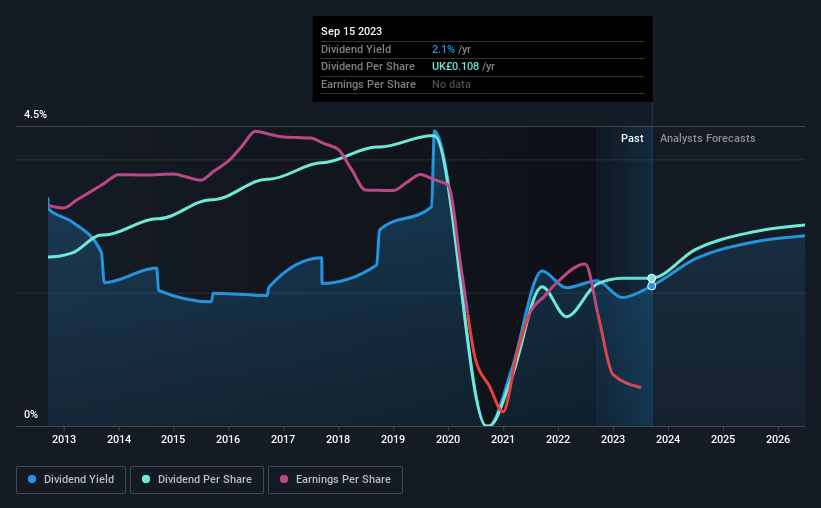Ricardo (LON:RCDO) Is Increasing Its Dividend To £0.0861
Ricardo plc (LON:RCDO) will increase its dividend on the 24th of November to £0.0861, which is 15% higher than last year's payment from the same period of £0.0749. Based on this payment, the dividend yield for the company will be 2.1%, which is fairly typical for the industry.
View our latest analysis for Ricardo
Ricardo's Payment Has Solid Earnings Coverage
Unless the payments are sustainable, the dividend yield doesn't mean too much. The company is paying out a large amount of its cash flows, even though it isn't generating any profit. This makes us feel that the dividend will be hard to maintain.
Analysts expect a massive rise in earnings per share in the next year. If the dividend extends its recent trend, estimates say the dividend could reach 19%, which we would be comfortable to see continuing.
Dividend Volatility
The company's dividend history has been marked by instability, with at least one cut in the last 10 years. The dividend has gone from an annual total of £0.124 in 2013 to the most recent total annual payment of £0.108. Doing the maths, this is a decline of about 1.3% per year. Declining dividends isn't generally what we look for as they can indicate that the company is running into some challenges.
The Dividend Has Limited Growth Potential
With a relatively unstable dividend, it's even more important to see if earnings per share is growing. Earnings per share has been sinking by 53% over the last five years. A sharp decline in earnings per share is not great from from a dividend perspective. Even conservative payout ratios can come under pressure if earnings fall far enough. Over the next year, however, earnings are actually predicted to rise, but we would still be cautious until a track record of earnings growth can be built.
We're Not Big Fans Of Ricardo's Dividend
Overall, while the dividend being raised can be good, there are some concerns about its long term sustainability. The company's earnings aren't high enough to be making such big distributions, and it isn't backed up by strong growth or consistency either. The dividend doesn't inspire confidence that it will provide solid income in the future.
Companies possessing a stable dividend policy will likely enjoy greater investor interest than those suffering from a more inconsistent approach. Meanwhile, despite the importance of dividend payments, they are not the only factors our readers should know when assessing a company. Without at least some growth in earnings per share over time, the dividend will eventually come under pressure either from competition or inflation. Businesses can change though, and we think it would make sense to see what analysts are forecasting for the company. If you are a dividend investor, you might also want to look at our curated list of high yield dividend stocks.
Have feedback on this article? Concerned about the content? Get in touch with us directly. Alternatively, email editorial-team (at) simplywallst.com.
This article by Simply Wall St is general in nature. We provide commentary based on historical data and analyst forecasts only using an unbiased methodology and our articles are not intended to be financial advice. It does not constitute a recommendation to buy or sell any stock, and does not take account of your objectives, or your financial situation. We aim to bring you long-term focused analysis driven by fundamental data. Note that our analysis may not factor in the latest price-sensitive company announcements or qualitative material. Simply Wall St has no position in any stocks mentioned.

